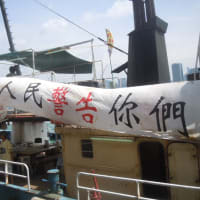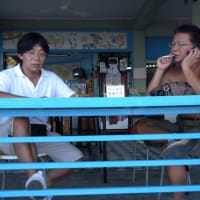今コメント(余計な一言とも言う)書く余裕がないので元記事だけ。
University may curb use of Cantonese
---Institution wants postgraduate courses to be taught in English or Putonghua to increase its profile
(South China Morning Post 2002.10.28 Hong Kong)
GARY CHEUNG
Academics at Chinese University could have their funding cut if they insist on teaching research postgraduate courses in Cantonese rather than English or Putonghua.
In a circular issued to several faculties in August, the university's management proposed that departments should declare which language they will use in each of their research postgraduate courses starting from the next academic year.
Under the proposal, a postgraduate course would not be allowed to enrol non-local students if it is taught in Cantonese and the department would then have its quota for non-local students cut. This would mean reduced funding for the department.
There are about 1,200 research postgraduate students enrolled at Chinese University this year, of whom about 400 are non-local.
The university's pro-vice-chancellor, Kenneth Young, said starting from the next academic year, academics would be required to convince senior management how they can cater for mainland or overseas students if their courses are taught in Cantonese.
"The proposal does not aim to force academics to switch to teaching in English," he said. "But we should not deprive non-local students of their choices."
A department head said senior management wanted more postgraduate courses taught in English to make the university more international in outlook.
Chinese University - which describes itself as dedicated to preserving and disseminating Chinese culture - has always emphasised bilingualism as the basis of its teaching.
Professor Kuan Hsin-chi, head of the department of government and public administration, said he supported the proposal.
"Some mainland and overseas students have complained that they have limited choices in master and doctoral courses because a considerable number of courses are taught in Cantonese," he said.
Other academics at the university said social science and arts faculties would be hit hardest under the proposal because many of their courses were taught in Cantonese.
Professor Young said the proposal only laid down a general principle and the senior management still had to work out the details.
But another anonymous department head said switching to English might discourage discussions in lecture rooms.
"It's a shallow thought to turn the university into an English training ground with the cost of hindering students' creative thinking," he said.
There were about 1,200 non-local research postgraduate students in the eight universities in 2000-01, according to figures from the University Grants Committee.
The ceiling on non-local postgraduates was raised from 20 to 33 per cent in 1998-99. Non-local students pay the same tuition fees as local postgraduate students.
University may curb use of Cantonese
---Institution wants postgraduate courses to be taught in English or Putonghua to increase its profile
(South China Morning Post 2002.10.28 Hong Kong)
GARY CHEUNG
Academics at Chinese University could have their funding cut if they insist on teaching research postgraduate courses in Cantonese rather than English or Putonghua.
In a circular issued to several faculties in August, the university's management proposed that departments should declare which language they will use in each of their research postgraduate courses starting from the next academic year.
Under the proposal, a postgraduate course would not be allowed to enrol non-local students if it is taught in Cantonese and the department would then have its quota for non-local students cut. This would mean reduced funding for the department.
There are about 1,200 research postgraduate students enrolled at Chinese University this year, of whom about 400 are non-local.
The university's pro-vice-chancellor, Kenneth Young, said starting from the next academic year, academics would be required to convince senior management how they can cater for mainland or overseas students if their courses are taught in Cantonese.
"The proposal does not aim to force academics to switch to teaching in English," he said. "But we should not deprive non-local students of their choices."
A department head said senior management wanted more postgraduate courses taught in English to make the university more international in outlook.
Chinese University - which describes itself as dedicated to preserving and disseminating Chinese culture - has always emphasised bilingualism as the basis of its teaching.
Professor Kuan Hsin-chi, head of the department of government and public administration, said he supported the proposal.
"Some mainland and overseas students have complained that they have limited choices in master and doctoral courses because a considerable number of courses are taught in Cantonese," he said.
Other academics at the university said social science and arts faculties would be hit hardest under the proposal because many of their courses were taught in Cantonese.
Professor Young said the proposal only laid down a general principle and the senior management still had to work out the details.
But another anonymous department head said switching to English might discourage discussions in lecture rooms.
"It's a shallow thought to turn the university into an English training ground with the cost of hindering students' creative thinking," he said.
There were about 1,200 non-local research postgraduate students in the eight universities in 2000-01, according to figures from the University Grants Committee.
The ceiling on non-local postgraduates was raised from 20 to 33 per cent in 1998-99. Non-local students pay the same tuition fees as local postgraduate students.




















先週、大陸籍被告の弁護人が、証人への反対尋問を行う言語として普通話の使用を求めていたケースがあったのですが、その時は裁判官は「香港の法廷の公用語は英語と中国語である。会話における中国語とは広東語である」として、訴えを退けた筈なんですが。アレまた変わったのかな。あーもー忙しくてかなわんっ後でゆっくり見る。
最近、South China Morning Postにすっごく多いんです、「3 languages(広東語・英語・普通話)」ネタ。
「台湾語を公用語に」という台湾、「普通話を公用語に」という香港。単純に見れば立場が正反対であると言える。
かねがね思っていたのですが、
もし国民党が
ナダれ込んで来たのが
台湾でなく香港だったら
(実際、第二次大戦後、イギリスは香港を放棄しようとしていたという説もアリ)
果たして香港は当時・その後の台湾のようになっていただろうか? ...広東語禁止、中国語教育、現地住民への弾圧と抵抗、独立運動...ウッ全然想像できない。
---
Judiciary rules Putonghua is an official court language
(South China Morning Post 2002.10.28 Hong Kong)
RAVINA SHAMDASANI
Putonghua is an official language for conducting court proceedings, along with English and Cantonese, the Judiciary has confirmed after a barrister's request to cross-examine a witness in Putonghua caused confusion about whether it was legally permissible.
Barrister Stephen Tang Lung-wai last week made the request to question a witness in Putonghua on behalf of three mainland defendants charged with conspiracy to defraud. The issue led to debate on whether Putonghua could be considered an official language in Hong Kong.
It is understood there has not yet been a trial heard in Putonghua apart from exceptional cases such as appeal hearings involving unrepresented mainland defendants in right-of-abode cases.
According to the Official Languages Ordinance, English and Chinese are the official languages, but the law does not specify whether this means only Cantonese.
District Court judge Fergal Sweeney said on Thursday that if called upon, he would rule that Chinese in the Hong Kong context meant Cantonese. He quoted Mr Justice Michael Hartmann's words in a ruling last year that "our courts allow for two official languages in the spoken form: English and Cantonese".
But the Judiciary has since for the first time publicly endorsed Putonghua as an official language for court proceedings.
A spokeswoman, in consultation with the Chief Justice, said that since "in the Hong Kong context, spoken Chinese usually refers to Cantonese and also includes Putonghua, court proceedings may be conducted in Putonghua".
The Judiciary listed several factors that should to considered when deciding which language is to be used.
"The paramount consideration is the just and expeditious disposal of the case or matter before the court, having regard to all the circumstance of the case," the spokeswoman said.
Factors to be considered include the language ability, wishes and rights of the accused or litigants to instruct a lawyer of choice, and the language ability of witnesses, lawyers and the judge or judicial officer in the case. The volume of documents that might have to be translated and the factual and legal issues in dispute may also be taken into consideration.
But even with the endorsement of Putonghua as an official court language, it is unlikely there will be a rush to use it, given the lack of lawyers who speak it.
The Judiciary did not have figures on how many judges speak Putonghua, but Bar Association figures show only 79 out of almost 800 barristers claim fluency.
Legal experts have also pointed out that conducting trials in Putonghua would mean the entire courtroom, from clerks to recorders, would have to be fluent in the language. With only 34 per cent of the population able to communicate in Putonghua, that would present an impediment.